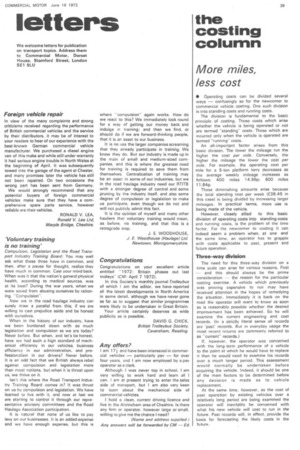'Voluntary training is no training'
Page 41

If you've noticed an error in this article please click here to report it so we can fix it.
Compulsion, Legislation and the Road Transport Industry Training Board: You may well ask what these three have in common, and then, after a pause for thought, realize they have much in common. Cast your mind back. When was it that the nation's general physical health, according to medical sources, was at its best? During the war years, when we were saved from abusing ourselves by rationing. "Compulsion".
Now we in the road haulage industry can surely draw a parallel from this, if we are willing to cast prejudice aside and be honest with ourselves.
When in the history of our industry, have we been burdened down with so much legislation and compulsion as we are today? Never before. But when, and let's be honest, have we had such a high standard of mechanical efficiency in our vehicles, business efficiency in our administration, and professionalism in our drivers? Never before. It is an odd fact that we British always rebel against compulsion and legislation more than most nations, but when it is thrust upon us, we thrive on it.
Isn't this where the Road Transport Industry Training Board comes in? It was thrust on us by compulsion and legislation. We have learned to live with it, and now at last we • are starting to control it through our representative advisory committees and the Road Haulage Association participation.
It is natural that none of us like to pay levy on our businesses. It is an added expense and We have enough expense, but this is
where "compulsion" again works. How do we react to this? We immediately look round for a way of getting our money back and indulge in training: and then we find, or should do if we are forward-thinking people, that it is an asset to our business.
It is no use the larger companies screaming that they already participate in training. We know they do. But our industry is made up in the main of small and medium-sized companies, and this is where the greatest need for training is required to save them from themselves. Centralization of training may be an asset in some of our industries, but we in the road haulage industry need our RTITB with a stronger degree of control and some pruning by the industry itself, and also some degree of compulsion or legislation to make us participate, even though we do not and will not publicly admit this fact.
It is the opinion of myself and many other hauliers that voluntary training would mean, as before, no training, and that this is a retrograde step.
J. E. WOODHOUSE, J. E. Woodhouse (Haulage) Ltd. Newtown, Montgomeryshire.




























































































